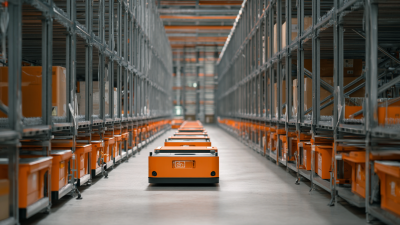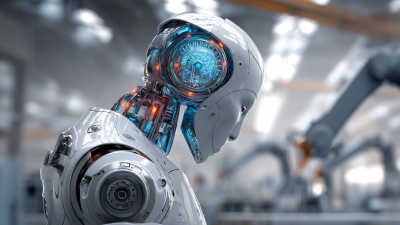Exploring the Future: Unconventional Robotics Careers You Never Knew Existed
 The field of robotics is rapidly evolving, presenting a plethora of unconventional careers that extend far beyond traditional engineering roles. According to a report by the International Federation of Robotics, the global robotics market is projected to grow to $210 billion by 2025, highlighting the increasing demand for skilled professionals in various sectors. As automation becomes integrated into industries like healthcare, agriculture, and entertainment, new roles such as robotics ethicists, autonomous systems operators, and drone traffic managers are emerging, reshaping the landscape of robotics careers. This evolution not only reflects technological advancements but also the need for diverse skill sets that address challenges in safety, regulation, and innovation. Exploring these unconventional paths can unveil opportunities for those looking to make a significant impact in a future driven by robotics.
The field of robotics is rapidly evolving, presenting a plethora of unconventional careers that extend far beyond traditional engineering roles. According to a report by the International Federation of Robotics, the global robotics market is projected to grow to $210 billion by 2025, highlighting the increasing demand for skilled professionals in various sectors. As automation becomes integrated into industries like healthcare, agriculture, and entertainment, new roles such as robotics ethicists, autonomous systems operators, and drone traffic managers are emerging, reshaping the landscape of robotics careers. This evolution not only reflects technological advancements but also the need for diverse skill sets that address challenges in safety, regulation, and innovation. Exploring these unconventional paths can unveil opportunities for those looking to make a significant impact in a future driven by robotics.
How to Identify Emerging Robotics Fields for a Unique Career Path
As the field of robotics continues to evolve, new career paths are emerging that go beyond traditional roles. Identifying these unconventional opportunities requires a mix of passion, adaptability, and a proactive approach to exploring new technologies. Delving into fields such as soft robotics, biomedical applications, and robotic ethics can unveil unique career options that align with your interests and strengths.

Tips: Start by engaging with online communities focused on niche robotics sectors. Platforms like forums and LinkedIn groups can provide insights into current trends and job openings. Additionally, attending conferences and workshops can help you connect with industry leaders and gain firsthand knowledge about emerging fields.
Another way to identify these career opportunities is to stay informed about advancements in technology and research. Subscribing to robotics journals and following innovations in AI and machine learning can help you pinpoint areas ripe for new career paths. Exploring interdisciplinary fields like robotics in agriculture or environmental conservation might also lead to fulfilling and unconventional roles that contribute to sustainable practices.
How to Acquire the Skills Needed for Non-Traditional Robotics Roles
In the rapidly evolving field of robotics, non-traditional roles are increasingly gaining prominence. Occupations such as robotics ethicists, robot design storytellers, and even robotic wellness coaches are emerging, reflecting the diverse applications of robotic technology. According to a report by the International Federation of Robotics, the global robotics market is projected to grow at an annual growth rate of 26% from 2022 to 2030, leading to a parallel rise in unconventional career opportunities in this sector.
To thrive in these unique roles, individuals need a combination of specialized technical skills and soft skills. For instance, a robotics ethicist must grasp not just engineering principles but also ethics, law, and policy frameworks. Meanwhile, robot design storytellers require proficiency in narrative techniques coupled with a strong understanding of user experience. Aspiring professionals can enhance their skill set through online courses, boot camps, and workshops that focus on interdisciplinary approaches, blending robotics with fields like psychology, arts, and social sciences. According to a study by McKinsey, companies that invest in continuous education for their employees report 40% higher growth in productivity, underscoring the importance of lifelong learning in non-traditional robotics careers.
How to Network Effectively in the Unconventional Robotics Industry
In the rapidly evolving field of unconventional robotics, effective networking is essential for career advancement and innovation. According to the World Economic Forum, the robotics industry is projected to grow by 26% annually, leading to a surge in demand for professionals with diverse skills in areas such as soft robotics, bio-inspired design, and autonomous systems. To navigate this emerging landscape, individuals must leverage both traditional and digital networking strategies to connect with industry experts and like-minded peers.
One effective approach is to participate in niche conferences and workshops that focus on unconventional robotics applications. A report from the International Federation of Robotics highlighted that personalized networking opportunities, such as hackathons and interdisciplinary meetups, can significantly enhance collaboration among professionals from different fields. Additionally, utilizing platforms like LinkedIn to join specialized groups can help individuals stay informed about the latest trends and connect with potential mentors. By immersing themselves in these targeted networking environments, aspiring roboticists can unlock new career possibilities and contribute meaningfully to the future of robotics.

How to Navigate Career Transitions into Robotics from Different Backgrounds
Transitioning into a career in robotics from a non-technical background can be both an exciting and daunting prospect. The key lies in identifying transferable skills and gaining relevant knowledge to bridge the gap. For instance, individuals with experience in fields such as marketing, psychology, or design can leverage their expertise in user experience and project management when entering robotics. Understanding how robotics fits into broader applications, including artificial intelligence, can also provide valuable perspective and open up new pathways.
Moreover, educational opportunities, such as programs tailored for veterans and service members, offer hands-on experience in AI-enhanced robotics. These programs not only impart technical skills but also emphasize teamwork and problem-solving, which are crucial in the robotics industry. Aspiring professionals should also consider coding boot camps or online courses that focus on specific programming languages commonly used in robotics. By actively pursuing these opportunities and networking within the industry, individuals can successfully navigate their career transition and explore unconventional roles that lie ahead in the robotics and automation sectors.
How to Stay Ahead: Continuous Learning for Future Robotics Opportunities
The landscape of robotics careers is rapidly evolving, prompting professionals to engage in continuous learning to remain competitive. As highlighted in recent insights, the demand for skills in AI, machine learning, and robotics is skyrocketing. By 2025, it’s projected that major advances in AI will create new job categories, with roles in AI engineering and robotics integration topping the list. According to industry reports, up to 40% of existing job categories may be substantially transformed by AI technologies, emphasizing the importance of upskilling for those currently in the workforce.
In the realm of robotics, unconventional careers are emerging that require a blend of innovative thinking and technical expertise. For instance, the role of robotic surgery specialists is becoming increasingly vital, as the integration of technology into healthcare transforms surgical practices. Early access to robotic innovations, coupled with comprehensive global mentorship programs, is setting the stage for medical professionals to excel in this future-ready environment. With AI complementing human abilities rather than replacing them, individuals who embrace ongoing education and adapt to these trends will find themselves at the forefront of the next industrial revolution.
Exploring Unconventional Robotics Careers
This bar chart illustrates the growth in demand for various unconventional robotics careers over the next decade. The data indicates a significant rise in interest in areas such as Robotics Software Engineering, AI Ethics in Robotics, and Autonomous System Design.

